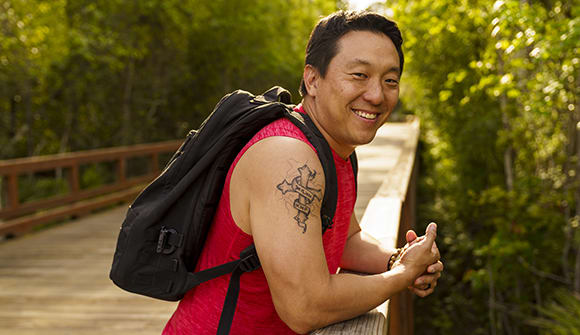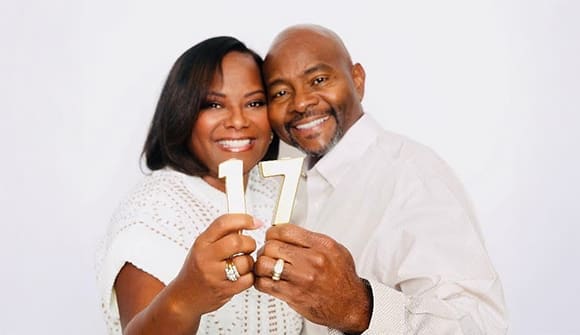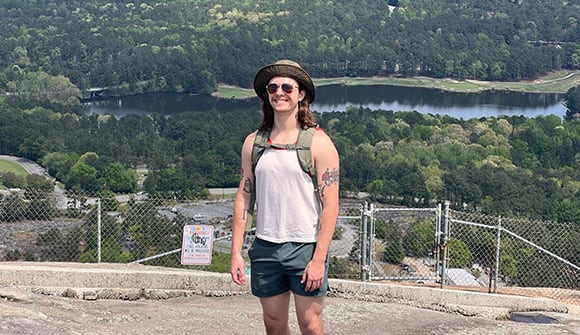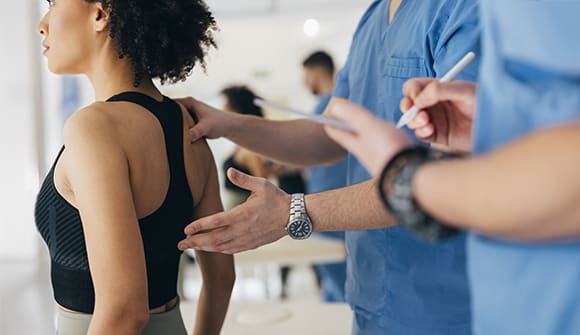Runner's recovery
Survivor spreads word about stroke in younger adults.
Article Date:

In January 2020, 43-year-old Donny Kwon decided to squeeze in a short workout during his lunch hour.
A fitness fanatic who has participated in several obstacle course races, the wealth management associate was jogging along Jacksonville’s Southbank Riverwalk when he suddenly felt a sharp pain in his head.
He stopped running and decided to rest until he felt better. Eventually, he walked back to his high-rise office and finished out his workday before driving home.
“I originally brushed it off as being dehydrated,” said Kwon, a father of two.
Slurring his words
Still feeling weak, Kwon decided to call his wife, Ashley, at work. During their conversation, Ashley realized right away that her husband of more than 10 years was not himself.
Her boss, Helen Michelle Dunham, overheard the conversation and immediately noticed Kwon was slurring his words.
Trouble speaking is one of the warning signs of stroke, along with arm weakness, facial drooping and vision problems. Dunham, who has a history of stroke in her family and is familiar with the condition, told Ashley to call 911.
“I was going downhill fast and I didn’t even know it,” Kwon said. “A stroke was the last thing I thought was happening.”
Seconds count
When Jacksonville Fire and Rescue Department personnel arrived at Kwon’s Nocatee home, he had developed a facial droop and was still slurring his words. He was quickly transported to the Emergency Center at Baptist Medical Center South, where he received a CT scan of his head and neck.
Through the use of interactive videoconferencing technology, known as telestroke, Mohamad Chmayssani, MD, a hospital-based neurologist with Lyerly Neurosurgery, was able to examine Kwon from a remote site and confirm he was having a stroke.
Dr. Chmayssani arranged for Kwon to receive Alteplase®, an FDA-approved blood clot-busting medication that gives stroke patients a better chance at recovery. He also requested Kwon be airlifted to Baptist Medical Center Jacksonville’s Stroke & Cerebrovascular Center for possible surgery.
Recognized as a certified Comprehensive Stroke Center by The Joint Commission, meaning it meets the standards to treat the most complex stroke cases, Baptist Jacksonville’s Stroke & Cerebrovascular Center specializes in the rapid diagnosis and treatment of all types of strokes using the latest advances in technology.
“Time is everything when it comes to stroke,” Dr. Chmayssani said.
Small tear, serious condition
Neurosurgeon Ricardo Hanel, MD, PhD, co-medical director of the Stroke & Cerebrovascular Center, was on duty when Kwon arrived at Baptist Jacksonville.
Dr. Hanel quickly realized Kwon was experiencing an intracranial dissection, an uncommon lesion caused when a small tear forms in the blood vessels that supply oxygen to the brain. The condition causes the body to produce blood clots to repair the tear, but those clots can break off and block blood flow, causing a stroke.
“Intracranial dissections don’t happen very often, but they are one of the most common causes of stroke in younger to middle-aged adults,” Dr. Hanel said. “But thanks to the quick treatment initiated by Dr. Chmayssani, we were able to reduce the severity of Mr. Kwon’s stroke."
To remove the clot in Kwon’s brain and restore blood flow, Dr. Hanel performed a minimally invasive procedure called a mechanical thrombectomy. During this type of procedure, a neurosurgeon inserts a small device called a stent into the affected blood vessel to keep it open and reduce the risk of a future stroke.
Thankful tattoo
One day after the procedure, Kwon was overjoyed to learn he had no permanent neurological damage from his stroke.
“After just a few days of recovery, I left the hospital completely unscathed,” he said. “I’m incredibly thankful.”
Over the next few months, Kwon had several MRIs of his brain, all of which showed no changes or bleeding in the blood vessels of his brain where the stroke occurred.
To honor his wife’s boss for the role she played in saving his life, Kwon got a tattoo in the shape of a Catholic cross on his right shoulder. It includes the date he experienced the stroke (Jan. 15, 2020) and Dunham’s initials (H.M.D).
Listen to your body
Vascular neurologist Scott Dellorso, MD, of Baptist Neurology, saw Kwon during his recovery period at Baptist Jacksonville and believes his quick door-to-treatment time, along with his healthy lifestyle habits, may have helped him avoid a worse outcome.
“He’s someone who looks like this never happened,” Dr. Dellorso said. “The best indicators of a stroke outcome are how fast you seek care after you begin experiencing symptoms, as well as your general health before your stroke. The quick thinking by those around Mr. Kwon, as well as his healthy lifestyle, were huge factors in his successful recovery.”
Now working remotely due to the pandemic, Kwon still laces up his running shoes at lunchtime.
In late March 2021, he was one of about 200 participants who scaled the stadium steps at TIAA Bank Field as part of the 13th annual American Lung Association Fight for Air Climb. Kwon donned a 30-pound rucksack for the charity event, finishing ninth overall in his division.
He believes listening to your body is essential for living a healthy life.
“Stroke was the last thing on my mind, but it’s important to trust your gut,” Kwon said. “If you feel something is wrong, make sure you get checked out.”
Time is brain when it comes to stroke. BE FAST and call 911 if you or a loved one experiences any sudden loss of balance, vision changes, facial drooping, arm weakness or speech difficulty. Lyerly Neurosurgery offers cutting-edge treatment for stroke and resources for cerebrovascular care. To request an appointment, call 904.388.6518.



